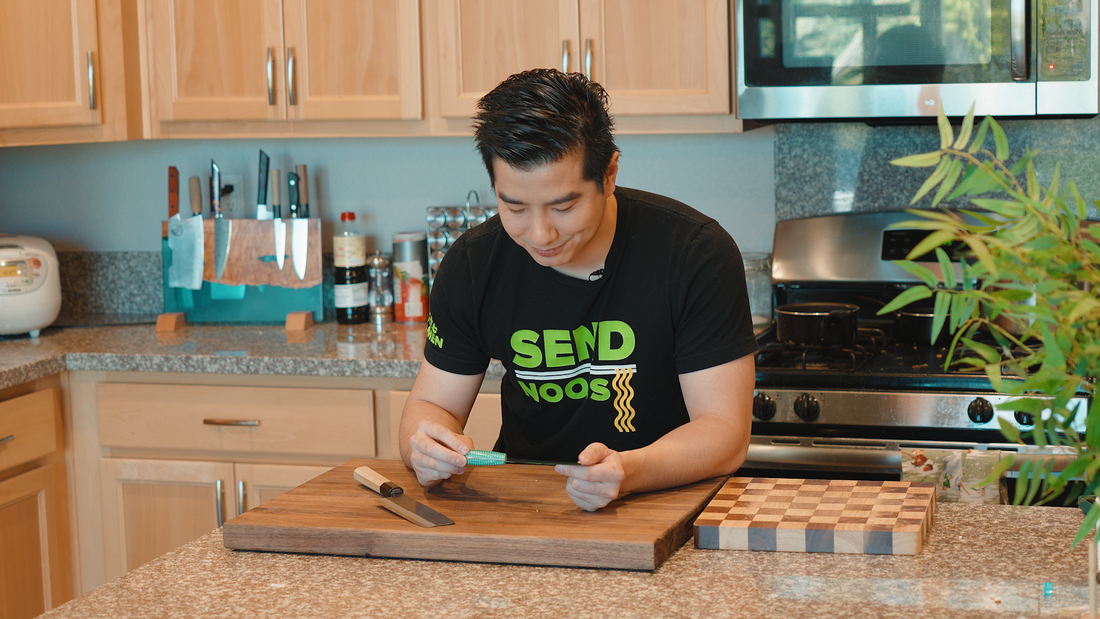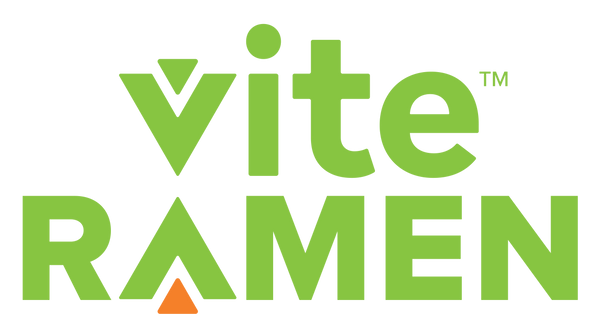
Why Are We Making Knives? This Is Why It Means So Much To Me
Share

Tim here.
Thank you.
When I first started Vite Kitchens and decided to make ramen, I had to give up on another dream.
I’d been stuck between wanting to make knives, and wanting to make ramen. I’d always loved knives from when I’d become the de facto knife sharpener in the Michelin Star kitchen I cooked at, and when I started to get deeper and deeper into them and eventually got a side gig as a professional knife sharpener at a knife shop, just so I could buy more knives from there.
I’d amassed a collection of all kinds of knives, from Japanese to German to Chinese to even a special, extremely rare Chris Reeve kitchen knife that looked unlike anything else out there.

One night, beaten, bedraggled, and exhausted, I stumbled out of my car, eyes bleary, forgetting to take my knife bag with me. I collapsed on my bed, the day’s sweat, oil, and grime still on me as I knocked unconscious for those precious few hours before I had to do it all over again.
And that night, someone saw that bag, and smashed my car window, and took all my knives and tools.
Before then, I’d never been much for sentimentality with tools. I’d never really thought about how much I cared about them, and what they represented for me-- they were something I’d used often, something I’d studied, but for their utilitarian practicality.
When I woke up and went to my car, and saw that the bag with all the knives I’d had was stolen, I’d felt a twisted, crushing sensation; a strange, foreign emotion caused by the loss, one that I'd never quite felt before.
Knives are the soul of the kitchen. It’s the tool that took so many different forms, the tool that allowed us to express our skill and our vision in the food we plated, the tool that enabled us to transform food from something that fills your stomach to an unforgettable experience.
In the professional kitchen, each and every person would select their knife as a unique expression of themselves-- to use the same primary knife as someone else would be to give up your own identity. I hadn’t realized it back then, but there was a distinct reason why I had chosen such a unique, different knife than everyone else. As much as I would’ve loved to claim it was because of the S35VN steel, that Chris Reeve was a legendary figure in the folding knife world, and about this feature and that, in the end, it was because it was unique, and it was pretty in the most divisive way possible.
Until that moment, as I stood there amongst the shattered glass, I hadn't realized just how much a knife could mean to me.
Growing up, my mom used a santoku-- an old, weathered thing with a broken tip, the surface scratched and branding marks worn and stolen by the passage of time. She told me once that she had seen it in a store when my parents first moved to California in 1996, and right then and there, suddenly wanted it more than anything, and bought it.
My dad was apprehensive about it, at first. Other knives could be gotten for much cheaper. If it could cut, he thought, then what’s the difference?
But she had been cooking, day in and day out, for my brother and I. In order to establish a new life and hope for a better future, they had made the difficult decision to emigrate to the USA when Tom and I were still babies. In 1993, when we were only 13 months old my dad came to the USA to study and work. At 22 months, my mom came along as well, wracked with guilt, entrusting us with our family in China and praying that they made the right decision.
It’d be more than a year and a half before we’d make it over the USA, at 44 months, or 3.5 years of age. My parents will likely never admit this, but they likely spent many nights laying awake, uncertainty surrounding their every breath, wondering if they made the right choices leaving us when we were so young.
When we did finally arrive, she cooked almost every meal we had, even though she’d also worked a full time job. I’d see that familiar, weathered santoku sitting next to her famous red-cooked pork belly, or leaves of bok choy lined with little droplets of water, or little slivers of golden ginger and green onion.
If we look at the knife from a purely utilitarian point of view, then she bought it because it made cooking faster, and easier, and she could spend less time and effort. When I called her to ask about it, she said as much, thinking primarily about the features and utilitarian benefits the knife offered, and justified the old purchase through that lens.
But as she spoke, I think I began to understand more about why she bought that knife, and why it was so important to get then. A better knife wasn’t just a time saver-- it was to take back the time that she’d given up. It was how she could nourish us, take care of us, take back those months and years she sacrificed in hopes of a better future and better life, and, more than anything else, that knife represented her ability to express her love for the children that she’d made such difficult decisions for.
When I began to build my collection again after the theft, I started to look at knives differently. Not just a tool, anymore, not just a means to an end, but as an expression of the person who held the knife.
Because a knife, in the kitchen, is there to make food. In the end, just a thin piece of metal, a means to an end-- and yet, it’s a tool that can reveal so much about who we are, and why we cook. For a chef, an expression of their skill and pride. For a hobbyist, a way to explore exciting new concepts they learned. And for me, and for my mom, a way that lets us express our love in a language that nothing else in the world can quite replicate.
So, why, then, are we making knives?
I don’t know. You tell me.
What’s a knife, and cooking, mean to you?
-Tim, CEO/Founder Vite Kitchens
----
You can find the honisuki knife here:
https://viteramen.com/pages/honisuki

and the nakiri here:
https://viteramen.com/pages/girl_dm_nakiri
